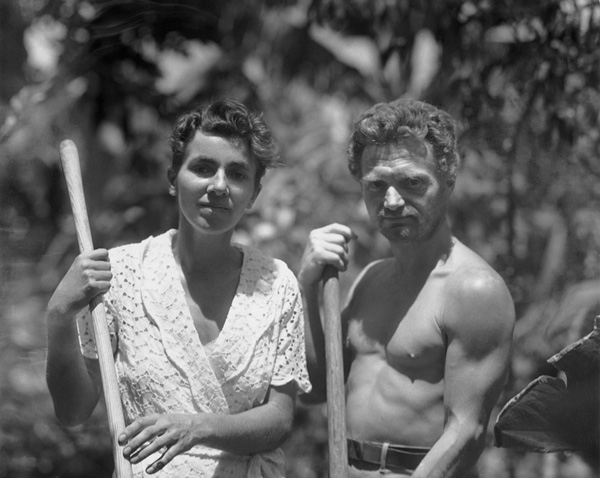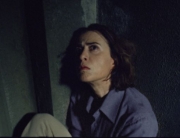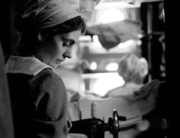
Dore Strauch and Friedrich Ritter in The Galapagos Affair: Satan Came to Eden (USC Special Collections/Zeitgeist Films)
It’s rare that filmmakers stumbles onto a true story with all the elements of a perfect drama—intrigue, primary accounts from the key players, just enough ambiguity to make things interesting—and that they’re lucky enough that the story still hasn’t been told. With The Galapagos Affair: Satan Came to Eden, Dayna Goldfine and Dan Geller have clearly discovered a tale well worth exploring: a lurid, almost unbelievable account of a group of Europeans who, in the 1930s, attempted to leave the world behind in favor of paradise, but which (of course) ended in tragedy.
In 1932, German doctor Friedrich Ritter and his mistress Dore Strauch decide to leave civilization for an uninhabited island in the Galapagos, Floreana, believing it to be the only way to establish a meaningful existence—as well as to escape the growing specter of war hovering over Germany. The two are a sort of Adam and Eve with a decidedly Nietzschean philosophy. Friedrich believes a need for social interaction to be a pathetic weakness, and though Dore tries to keep up with him, he heaps scorn on her for seeking the solution to her loneliness in a pet burro. (Even more disturbingly, it’s mentioned that Dore suffered from MS and that Friedrich took over her care, emphasizing the power of positive thinking in lieu of actual medical treatment—“tough love” seems an understatement.)
Film footage and photos of the two show their lives to be arduous but also illustrates their resourcefulness—scenes of Friedrich bathing in a makeshift shower, for instance, imbues the two with a humorous Swiss Family Robinson vibe that tempers the intensity of his dark and melancholy philosophy. Soon, however, the couple is joined by another family, Heinz and Margret Wittmer, who decide to leave the world behind them, seeking what they think will be an improved life for their ill son Harry. (They hope, too, to benefit a bit from living near a physician, as Margret is several months pregnant upon arrival and plans to deliver her child while on the island—one of many, many details that should make viewers reel.)
Predictably, the dour Friedrich is none too pleased to have company, but the families maintain relations, living about an hour apart from each other. They rely upon occasional supplies brought from the mainland, but mostly forge an independent existence. The not-so-happy community is finally completed when it is joined by the Baroness Eloise von Wagner and her two adoring gigolos (truth is not only stranger but even more ridiculous than fiction—viewers may be wondering if the Millionaire or the Professor are up next).
Though the film occasionally veers on melodrama (the piercing, haunting score is at times overkill), it succeeds in building an ominous tone. First-person written accounts are narrated by actors (Cate Blanchett, Thomas Kretschmann, Diane Kruger, among others), German accents and all, and they give the audience a real sense of the relationships between this eccentric cast of characters. Alongside the footage and photos, audiences will truly be enveloped into this bizarre world.
However, the film does drag a bit. At two hours, there’s a ton of setup (and perhaps a bit too much time devoted to the hilarious antics of the vamping, seductive Baroness), and yet the film seems to move fairly quickly when it takes its Picnic at Hanging Rock turn, discussing the mysterious disappearances of two of the castaways and an equally mysterious death.
Though the entire narrative is built upon foreshadowing the disappearances, what might have happened seems to be glossed over as various talking heads provide differing opinions. Essentially, the film is centered upon the inner thoughts and motivations of its principal characters, Dore and Margret in particular: what drove them here, what they felt and experienced, what they hoped to accomplish.
The film also often interrupts the focus on the Floreana inhabitants for interviews with others who also left for the Galápagos or who grew up on these islands with parents who were apparently motivated by the same things. One woman tells a particularly disturbing tale. She fled the island as an adolescent when her community and family attempted to marry her off to a man 15 years her senior. These perspectives add further to the sense that despite the beauty of the locale, there’s nothing remotely ideal about these communities.
Present-day scenes of the Galápagos (yes, featuring tortoises and blue-footed boobies) are appropriately gorgeous and do justice to the concept of finding a true, unspoiled Eden. However, the narrative is fairly heavy-handed about its overall takeaway. One interviewee points out that the folly of the castaways was to assume that paradise was a place rather than a condition. Another gravely intones that you take yourself wherever you go. Despite these flaws, this is compelling told tale. By turns almost comically grotesque and ominously haunting, it should stay with viewers.
















Leave A Comment